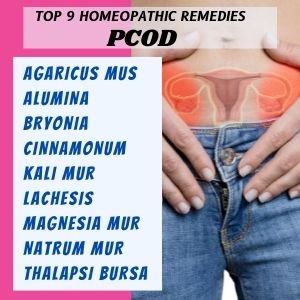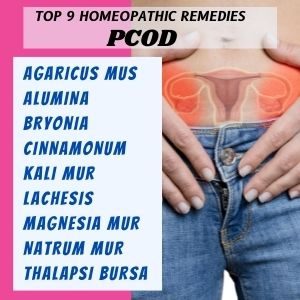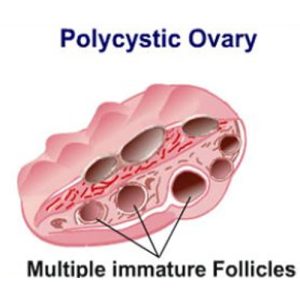Polycystic Ovarian Disease (PCOD), also known as Polycystic Ovary Syndrome (PCOS), is a common health issue affecting women of reproductive age. The ovaries, which are responsible for releasing eggs for fertilization, contain follicles that develop into cysts in women with PCOD. Normally, eggs mature and are released every month, but in PCOD, multiple follicles fail to mature, leading to the formation of cysts. These cysts are non-cancerous but contribute to hormonal imbalances, which can lead to irregular menstrual cycles, infertility, and other symptoms.
The exact cause of PCOD is unknown, but several factors can contribute to its development, including:
Women with PCOD may experience a variety of symptoms, including:
Irregular periods refer to cycles that are longer or shorter than the usual 28 days, with a gap of more than 35 days between periods. In women with PCOD, the hormonal imbalance prevents the ovaries from releasing eggs, disrupting the menstrual cycle. Irregular or absent periods are common symptoms of PCOD.
Infertility is the inability to conceive after one year of regular, unprotected sex. In PCOD, the hormonal imbalance affects ovulation, preventing the release of eggs from the ovaries, which makes conception difficult. Many women with PCOD face challenges with infertility, but with proper treatment, conception can be achieved.
Menses difficulty refers to irregularities in menstruation, including missed periods, heavy bleeding, or painful periods. Women with PCOD often face difficulty with their menstrual cycle due to the failure of ovulation and the formation of cysts in the ovaries.
Dysmenorrhoea refers to painful menstruation, commonly experienced as cramps during periods. Women with PCOD often experience dysmenorrhoea due to hormonal imbalances and the accumulation of cysts in the ovaries, which can cause inflammation and discomfort.

Homeopathy offers a natural approach to treating PCOD by balancing hormones and addressing underlying issues. Below are some homeopathic remedies commonly used to manage PCOD symptoms:
At HomoeoCARE, our homeopathic treatment focuses on addressing the root cause of PCOD rather than just masking symptoms. We aim to help women balance their hormones naturally, promoting regular periods, reducing cyst formation, and improving fertility. Our treatment also targets associated symptoms like weight gain, acne, and excessive hair growth, enabling women to regain confidence and improve their overall health.
For personalized treatment and to learn more about homeopathic solutions for PCOD/PCOS, consult with our experienced doctors at HomoeoCARE.


PCO – D (Disease)
PCO – S (Syndrome)
Both are diseases of the ovarian system however the cause is different.
PCOD s a medical condition in which the ovaries release partially maturing eggs and when these eggs are not released, they get converted into cysts. PCOD is a very common condition in females.
PCOS is a complex metabolic disorder where the body starts producing an abnormal higher quantity of the male hormone (androgen) and this leads to the disruption in the release of eggs.
The main difference between PCOD and PCOS is that PCOS has higher incidences of Infertility because of hormonal irregularities. Since PCOS is a metabolic disorder, it has more risk to develop other diseases like Diabetes, Hypertension, Cardiac problems, Obesity, etc.
Homeopathic medicines usually take 4–6 months to normalize the menstrual cycle and an additional 3–4 months for complete recovery. However, the duration of treatment varies from person to person and depends on other associated symptoms.
The main symptom of PCOS is irregular menstruation.
MYTH 1: Females who have kids or are reaching menopause don’t require treatment.
No, because PCOS isn’t confined to infertility. While it was once thought that PCOS only affected pre-menopausal women in their 30s, this is not so now. PCOS does not discriminate based on age. PCOS makes females vulnerable to obesity, cholesterol, high BP, etc., over time. Irregular periods tend to thicken the endometrial lining, leading to conditions like endometriosis.
MYTH 2: Oral contraceptives/hormone pills will regulate periods.
Yes and no, because it will balance your hormone levels and continue to do so as long as you take them, but your body will never learn to regulate it by itself. Your body becomes dependent on those pills, and the cysts on ovaries will not go.
MYTH 3: There is no cure for PCOS.
No, as per knowledge, there is no permanent cure for PCOS in modern medicine, as it just supplements the body with artificial hormones. But in homeopathy, being a holistic science, we approach the disease in detail, taking into account your lifestyle, stress factors, and environmental changes that affect the hormonal system. So instead of letting PCOS control you, choose the right treatment at HomoeoCARE and control your PCOS once and for all.